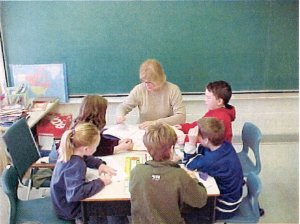
It has been noted in the research that boys are lagging behind the girls in school literacy. Current research focuses a great deal on family and community literacy (Barton & Hamilton, 1998; Taylor & Dorsey- Gaines 1988; Heath 1983). It is also suggested that literacy acquisition is affected by indirect factors including: "Frequency of children's outings with adults... the emotional climate of the home, time spent interacting with adults, level of parental financial stress, enrichment, activities and parental advocacy at schools" (Auerbach, 1995, p. 19).
For some children in this study, family and community literacy experiences were not a good fit with school-based literacy. The system may have ignored those indirect factors as they were not always understood to be important in literacy acquisition. Thus some school children find themselves marginalized - a condition most human beings do not want for themselves. To be sure that these children get an education they must be encompassed in mainstream school literacy.

This project set out to embrace all by
introducing literacy methods and strategies that
acknowledge the learners interests. The research on
boys' learning reveals that they like to be social and
interactive, discuss before writing and prefer to
choose texts that come from their own world view
(Barrs & Pidgeon, 1994, 1998; Booth, 2002; Wilhelm,
2002). Designing materials and activities to
accommodate boys' learning needs did not
disadvantage the girls.
The reading assessment results reveal the boys' literacy performance did improve in this particular case study. However, the girls improved too and are still ahead. The gap remains. The boys gained most in their attitudes towards reading. Indirect factors that account for literacy acquisition (OECD, 2001; Auerbach, 1995) are recognized and valued in the Boys' and Girls' Literacy Project. The boys' improved attitude toward reading is a part of that definition of literacy that allows learners to understand themselves to be literate, even though they may not pass a school literacy test. In certain contexts these boys are literate; in the literature circles, with the mentors, and when browsing through the book collection.